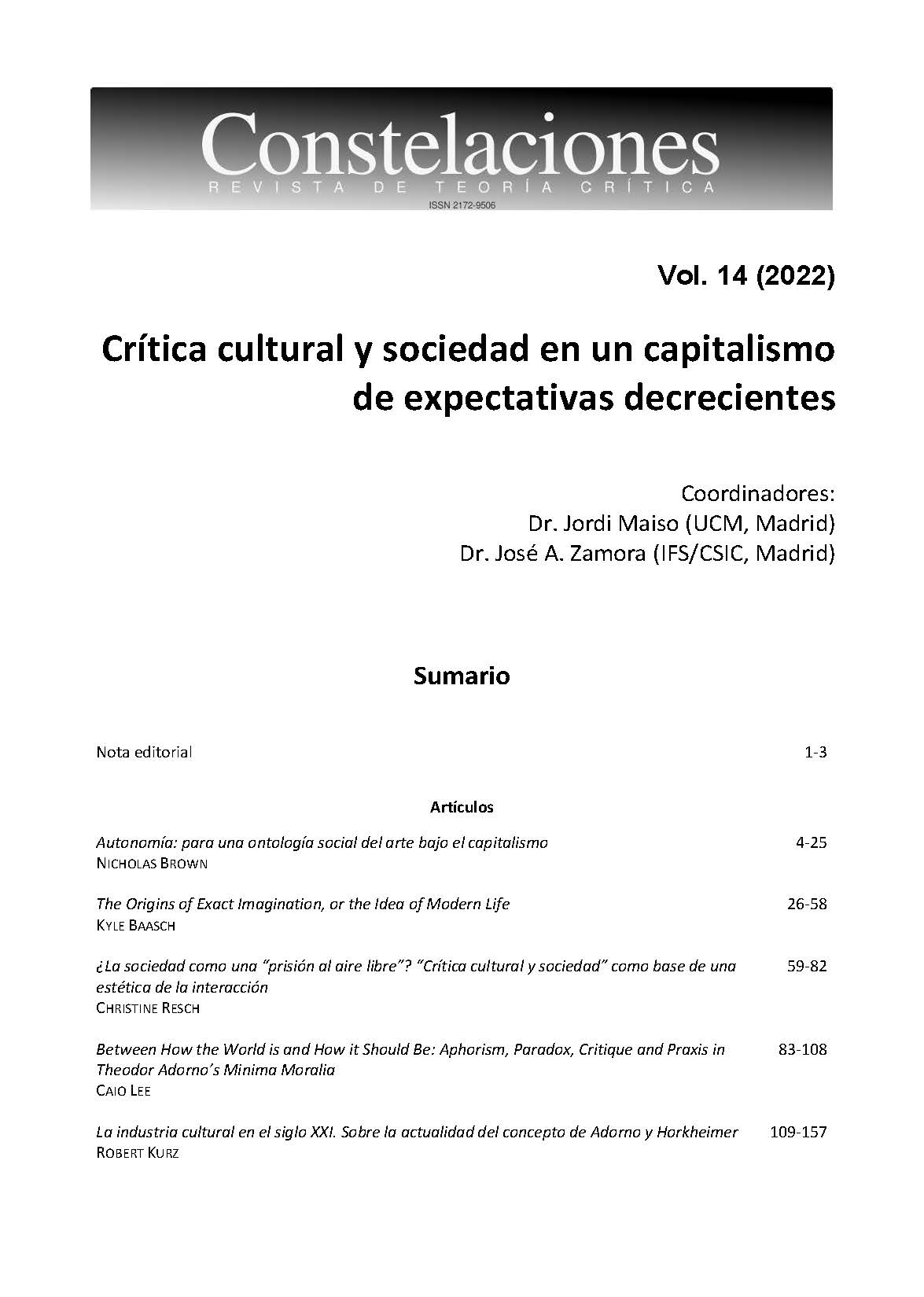Between How the World is and How it Should Be: Aphorism, Paradox, Critique and Praxis in Theodor Adorno’s Minima Moralia
Palabras clave:
Theodor W. Adorno, Minima moralia, aphorism, critique, praxis, paradox, fidelity, irrationalismResumen
The reflections of the aphorisms of Minima Moralia may often seem opaque or obscure, appearing to take indirect routes in their investigations. The objective of this article is to outline an interpretation of this way of proceeding by high¬lighting how it is entangled with particular critical intentions. By means of an in-depth analysis of aphorism 110, “Constanze”, we shall seek to indicate how it strives to explore particular textual elaborations and effects in order to consti¬tute an immersive reading experience, which not only theoretically grasps, but also practically overcomes the prevailing badness of everyday life, constituting a praxis that the reader can incarnate through the reading itself. Such reading experience, we argue, relies on textual immersive effects to realize the critical potentiality of the paradox as a mediating force between how the world is and how it should be.
Descargas
Citas
ADORNO, Theodor (2012), Minima Moralia, Frankfurt am Main, Suhrkamp.
ADORNO, Theodor (2005), Minima Moralia, trans. by E. F. N. Jephcott, New York, Verso.
ADORNO, Theodor (2008), Minima Moralia, trans. by Gabriel Cohn, Rio de Janeiro, Beco do Azougue.
BERNARD, Andreas, e RAULFF, Ulrich (ed.) (2003), Minima Moralia neu gelesen, Frankfurt am Main, Suhrkamp Verlag.
BERNSTEIN, J. M. (2001), Adorno – Disenchantment and Ethics, New York, Cambridge University Press.
ECO, Umberto (2004), “Note sull’aforisma. Statuto aletico e poetico del detto breve” en Teoria e storia dell’aforisma (Ed. Gino Ruozzi), p.152-166, Milano, Mondadori Editori.
FINLAYSON, James Gordon (2002), “Adorno On The Ethical and The Ineffable” en: European Journal of Philosophy, v.10:1: 1-25, Hoboken, Wiley-Blackwell.
JAEGGI, Rahel (2005), “‘Kein Einzelner vermag etwas dagegen’ – Adornos Minima Moralia als Kritik von Lebensformen” en Dialektik der Freiheit (ed. Axel Honneth), Frankfurt am Main, Suhrkamp Verlag.
MORSON, Gary Saul (2003), “The Aphorism: Fragments from the Breakdown of Reason” en New Literary History, V. 34, n.3: 409–429, Baltimore, Johns Hopkins University Press.
NORBERG, JAKOB (2011), “Adorno’s Advice: Minima Moralia and the Critique of Liberalism” en PMLA, v. 126, n. 2, New York, PMLA.
Descargas
Publicado
Cómo citar
Número
Sección
Licencia
Derechos de autor 2022 Caio Lee

Esta obra está bajo una licencia internacional Creative Commons Atribución-NoComercial-CompartirIgual 4.0.
Aquellos autores/as que tengan publicaciones con esta revista, aceptan los términos siguientes:
1. Los autores/as conservarán sus derechos de autor y garantizarán a la revista el derecho de primera publicación de su obra, el cuál estará simultáneamente sujeto a la Licencia de reconocimiento de Creative Commons CC BY-NC-SA 4.0 que permite a terceros compartir, redistribuir y adaptar la obra siempre que sea con fines no comerciales y se indique su autor y su primera publicación esta revista.
2. Los autores/as podrán adoptar otros acuerdos de licencia no exclusiva de distribución de la versión de la obra publicada (p. ej.: depositarla en un archivo telemático institucional o publicarla en un volumen monográfico) siempre que se indique la publicación inicial en esta revista.
3. Se permite y recomienda a los autores/as difundir su obra a través de Internet (p. ej.: en archivos telemáticos institucionales o en su página web) antes y durante el proceso de envío, lo cual puede producir intercambios interesantes y aumentar las citas de la obra publicada. (Véase El efecto del acceso abierto).
Confidencialidad de los datos
1. Constelaciones. Revista de Teoría Crítica garantiza que los datos que nos envíe serán utilizados únicamente para atender sus demandas manifestadas en este mensaje.
2. Sus datos no serán cedidos a terceros.
3. Cuando lo desee puede solicitar que sus datos sean eliminados de nuestros registros.





